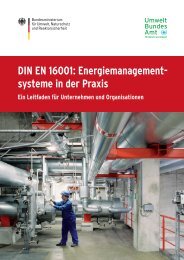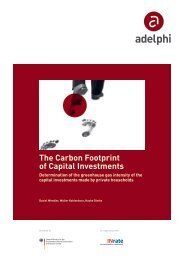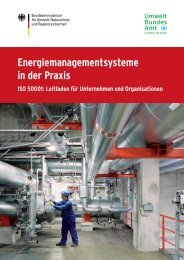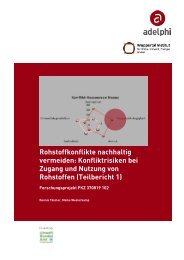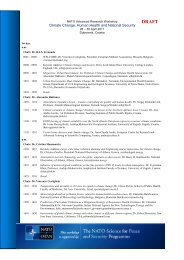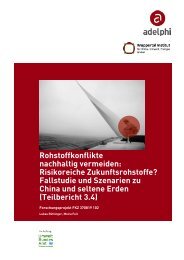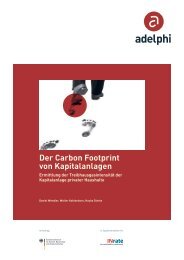DIN EN 16001: Energy Management Systems in Practice - adelphi
DIN EN 16001: Energy Management Systems in Practice - adelphi
DIN EN 16001: Energy Management Systems in Practice - adelphi
You also want an ePaper? Increase the reach of your titles
YUMPU automatically turns print PDFs into web optimized ePapers that Google loves.
3. take action if the energy policy cannot be implemented:<br />
You must f<strong>in</strong>d out what made deviations take place<br />
and ensure that the problem does not repeat itself.<br />
4. Make a plan for your records<br />
You must keep records of your energy-related activities.<br />
With these records, document the realisation of<br />
energy objectives and targets, energy programmes<br />
and action plans. The records depend on the company<br />
and must conform to the requirements of your EnMS.<br />
They should be traceable, legible and accessible and<br />
should be directly assigned to the relevant processes,<br />
activities or persons.<br />
In the follow<strong>in</strong>g, you will f<strong>in</strong>d a list of documents<br />
which are normally <strong>in</strong>cluded <strong>in</strong> the records:<br />
•<br />
•<br />
Information on relevant laws and formalities<br />
Records on tra<strong>in</strong><strong>in</strong>gs<br />
• Communication media for all <strong>in</strong>terest groups, such as<br />
press releases, campaigns for rais<strong>in</strong>g awareness, presentations,<br />
websites etc.<br />
26 Accord<strong>in</strong>g to <strong>DIN</strong> <strong>EN</strong> <strong>16001</strong>.<br />
If the requirements that <strong>DIN</strong> <strong>EN</strong> <strong>16001</strong> sets for EnMS are not fulfilled, then you must<br />
take corrective action.<br />
This is applicable, for <strong>in</strong>stance, when the behaviour of employees or the development<br />
of the company are not conform<strong>in</strong>g to the energy policy, the energy objectives<br />
and targets or to the energy programme.<br />
Deviations should be documented but there are no<br />
guidel<strong>in</strong>es on how you have to respond to them.<br />
• Essential energy consumption and <strong>in</strong>dicators on energy<br />
performance<br />
• Records on <strong>in</strong>stallation, review, ma<strong>in</strong>tenance and<br />
calibration of measur<strong>in</strong>g equipment and devices<br />
• Communication of the energy policy to suppliers and<br />
other contractors<br />
• Due dates for monitor<strong>in</strong>g and ma<strong>in</strong>tenance of energy<br />
consum<strong>in</strong>g facilities<br />
•<br />
•<br />
Purchase of energy-efficient goods and equipment<br />
Results of audits and management reviews<br />
In comparison to ISO 14001, no substantial changes are necessary to the procedures for<br />
manag<strong>in</strong>g records.<br />
Ensure that all the records necessary for an effective management of your EnMS are<br />
ma<strong>in</strong>ta<strong>in</strong>ed. Make certa<strong>in</strong> that it is clear to which activity, product or service a record<br />
relates.<br />
As an EMAS user, you already fulfil all the prerequisites as you must regularly collect all<br />
<strong>in</strong>formation on your environmental performance for updated environmental statements.<br />
26<br />
63



